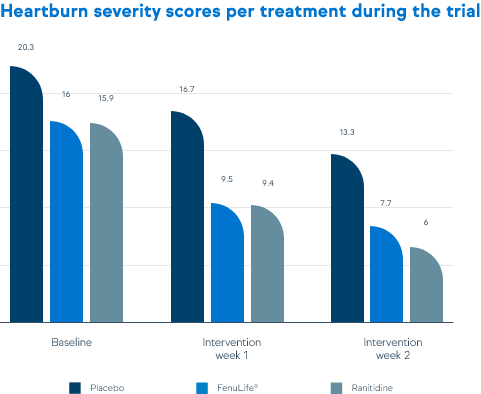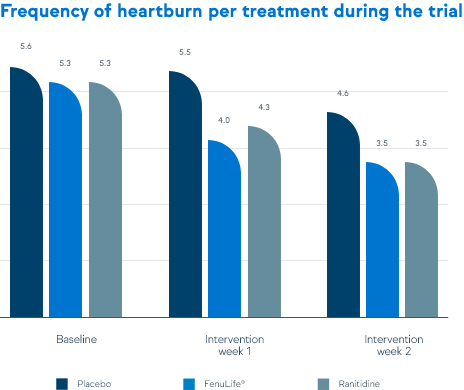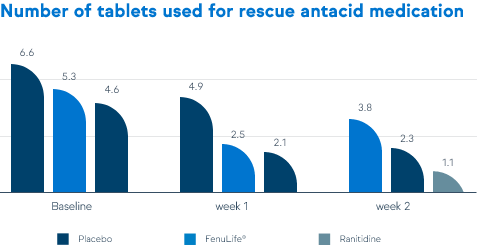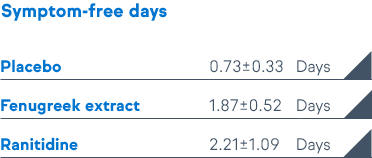Anti-heartburn effects of a fenugreek fiber product
By Roberto A. DiSilvestro, Columbus Nutraceuticals Consulting Inc. Dublin, OH, USA, July 2010
Overview
Heartburn, commonly referred to as stomach acid reflux or acid indigestion, is a frequently occurring inconvenience among populations worldwide. As many as 10% of Americans have episodes of heartburn every day, and 44% report heartburn symptoms at least once a month. People who experience heartburn twice a week or more may have Gastroesophageal Reflux Disease (GERD). European research shows that 1 out of every 10 adults suffers from GERD. The incidence of heartburn is spread across the whole population, but seems to increase dramatically above the age of 40. More than 50% of men and women with GERD are in the age-bracket of 45 to 64 years.
Study design
In this two-week placebo-controlled, randomized clinical trial, 45 subjects suffering from heartburn, on average of 3-8 times per week, were divided in 3 groups of 15 subjects. Subjects had a 1 week baseline period which was used for the pre-treatment characterization of heartburn symptoms. Subjects were then randomly assigned to one of three treatments to be followed for 2 weeks post baseline. Treatments were: FenuLife (500mg per capsule, four capsules taken twice/day, 4 g total daily dose), Ranitidine (75 mg per pill, one pill taken twice/day, 150 mg total daily dose) and placebo (starch capsules, four capsules taken twice/day). The placebo and FenuLife group were blinded to their assignment. The ranitidine group, which served as a positive control, was unblinded. All subjects were instructed to take the assigned product 30 min before their two biggest meals of the day with the other meal to be a bland meal. For that meal, subjects were given written guidelines and list of examples.
Conclusion
The water soluble fiber fraction of FenuLife was more effective than placebo, and similarly effective as the positive control (Ranitidine). This shows that FenuLife may provide a natural alternative for the treatment of heartburn or GERD with an efficacy similar to that of OTC drugs like ranitidine. A recommended dosage is 2 g FenuLife in capsule or tablet together with a glass of water, 20 to 30 min prior to two meals per day.
Published as:
Disilvestro et al. (2010). “Anti-heartburn effects of a fenugreek fiber product.”
Phytotherapy Research 25(1): 88-91
Results & Discussion
Heartburn, commonly referred to as stomach acid reflux or acid indigestion, is a frequently occurring inconvenience among populations worldwide. As many as 10% of Americans have episodes of heartburn every day, and 44% report heartburn symptoms at least once a month. People who experience heartburn twice a week or more may have Gastroesophageal Reflux Disease (GERD). European research shows that 1 out of every 10 adults suffers from GERD. The incidence of heartburn is spread across the whole population, but seems to increase dramatically above the age of 40. More than 50% of men and women with GERD are in the age-bracket of 45 to 64 years.

In addition, the frequency of heartburn significantly decreased in both FenuLife and Ranitidine groups.

Furthermore, subjects in the FenuLife group showed an average of 1.9 symptom-free days at the end of the second intervention week. This was significantly more compared to placebo (0.7 symptom-free days)


Regarding the use of rescue medication, all three interventions produced statistically significant reductions in both intervention weeks. However, the number of tablets used as rescue medication in both FenuLife and Ranitidine groups was significantly lower compared to placebo (Figure 3).



